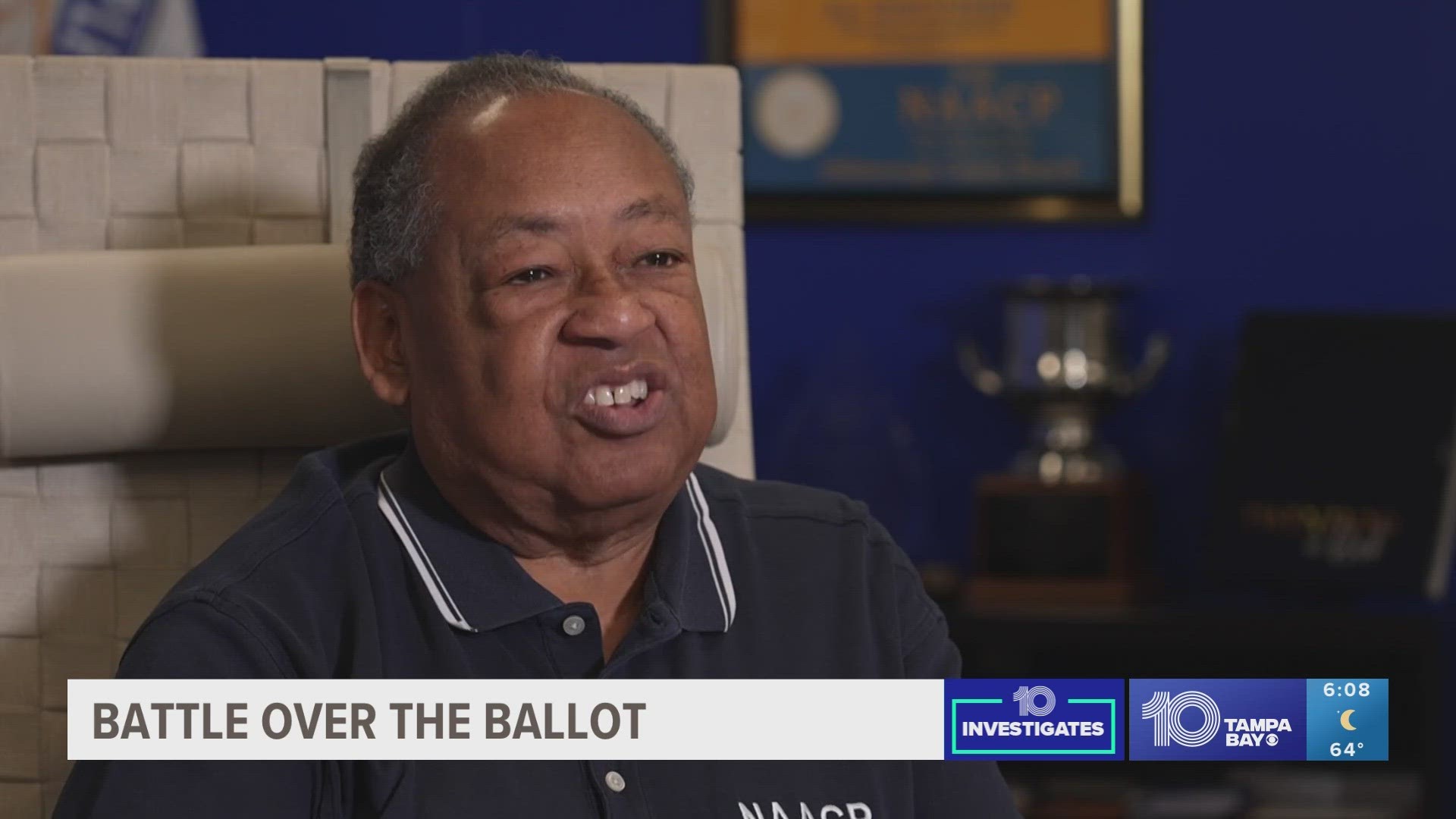TAMPA, Fla. — A national NAACP leader based in Tampa says recent challenges in federal court to the Voting Rights Act of 1965 could eviscerate protections for minority voters and erode decades of precedent.
“We need the protection of the Voting Rights Act that was provided in 1965 and that people bled and died for,” Leon Russell, chairman of the NAACP Board of Directors, said.
In 1965, President Lyndon B. Johnson signed the Voting Rights Act into law after civil rights demonstrations, particularly in Selma, Alabama, highlighted the brutal racism Black Southerners experienced trying to exercise their right to vote.
For decades, private groups like the NAACP have been able to sue for voter protection under Section 2 of the Voting Rights Act of 1965, which prohibits voting qualifications and practices that deny voting rights based on race.
However, the Eighth Circuit Court of Appeals upheld a lower court ruling stating that only the attorney general has enforcement power and that private groups do not have a right of action to use. This decision came after the NAACP challenged a house redistricting plan the group says dilutes Black voting power.
RELATED: Federal appeals court deals a blow to Voting Rights Act, ruling private plaintiffs can't sue
The appeals court ruled last week it will not rehear the case, where a three-judge panel ruled in November that “private parties cannot enforce Section 2. The enforcement power belonged solely to the attorney general…”
"The Arkansas case is, probably after Shelby, one of the most potentially damaging things that could happen to the Voting Rights Act,” Russell said. “[The Department of] Justice can come in…but it’s up to groups like the NAACP, the Lawyers Committee, the Legal Defense Fund, to really get out there and be private attorneys general, if you will, to help protect the rights of citizens across the nation."
Russell says leaving litigation power to the attorney general could cause enforcement of the Voting Rights Act to vary from administration to administration.
“You could have a presidential administration that's friendly to civil rights and voting rights who would aggressively use the act. But you can have other administrations that are not so friendly to the act,” he said.
According to the ACLU, private groups have litigated hundreds of cases over the years under Section 2. But with court questions on whether the 1965 Congress “clearly intended” for private groups to sue,
Russell says the landmark civil rights legislation is in jeopardy. If the NAACP appeals the latest ruling, it’s a case that could head to the Supreme Court.
"We know it's a 6-3 conservative court, so most people would think this may be in danger,” Lars Hafner, 10 Tampa Bay political analyst, said.
Florida has seen its own changes to voting laws in recent years, including restrictions on first-time voters, third-party registration groups and vote-by-mail ballots. Some say these burden voters; Gov. Ron DeSantis has said these changes bolster election integrity and security.
“Right now I have what we think is the strongest election measures in the country,” DeSantis said while signing an elections bill on Fox News in 2021.
In addition to changing voter laws, Florida is also having its own battle over redistricting. The state's Supreme Court says it will now hear a case on the constitutionality of a redistricting plan that plaintiffs say violates the state's "Fair Districts Amendment," which says you can't draw districts that keep minority groups from electing who they want.
"They dismantled the district in North Florida of Al Lawson, an African American who had an African American district to turn it into a more Republican district throughout the state,” Hafner said.
Gov. DeSantis in 2022 defended the new district lines. “We are not going to have a 200-mile gerrymander that divvies up people based upon the color of their skin. That is wrong,” he said. “That is not the way we’ve governed in the state of Florida.”
Dr. Kareem Crayton of the Brennan Center for Justice says that statement needs context.
"That's quite an exaggeration to say that a district drawn to allow minority voters an opportunity to elect is per se a gerrymander,” he said. “In fact, we've got a court saying on the record that what the governor has drawn is a gerrymander."
It's unclear yet what impact the case could have on the 2024 elections now that the Florida Supreme Court is involved. Either way, Russell says he and his organization will continue to fight to protect the rights of minority voters.
“In Florida, we need Section 2…we need the Voting Rights Act intact, and we need the Congress to move on it now,” he said.
Right now—the decision from the Eighth Circuit Court of Appeals only applies in Arkansas, Iowa, Minnesota, Missouri, Nebraska, North Dakota and South Dakota. If the Supreme Court hears the case, there could be a nationwide impact.
Emerald Morrow is an investigative reporter with 10 Tampa Bay. Like her on Facebook and follow her on X. You can also email her at emorrow@10tampabay.com.

